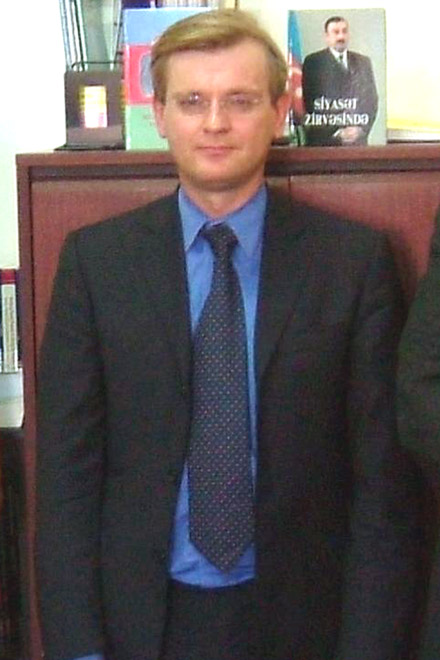An exclusive interview of Trend with Vitali Kramarenko Mission chief for Azerbaijan of the IMF Middle East and Central Asia Department
Question: How do you estimate the results of the last visit of IMF mission to Azerbaijan?
Answer: The 2005 Article IV consultation mission and the Azerbaijan authorities reached a broad consensus on the assessment of the challenges that the Azerbaijan economy will face in 2006 and beyond. The main challenge will be to balance the governments desire to rapidly develop infrastructure and improve living conditions with the need to avoid excessive public spending that will inevitably lead to pressures on either prices or the nominal exchange rateboth of which may undermine the competitiveness of the non-oil economy.
Question: Which program will be implemented for continuing cooperation with the IMF under the agreement with the Azerbaijani government? The IMF will render the consultative assistance to Azerbaijan. In which periodicity will the IMF mission make reviews in this respect?
Answer: The 2005 Article IV consultation mission discussed various forms of cooperation between Azerbaijan and the IMF. In accordance with the IMFs Articles of Agreement, the IMF will send one full-fledged Article IV consultation mission to Azerbaijan annually as part of its bilateral surveillance of the member countries. This mission will report on its findings to the IMF's Executive Board, but there might be one or two additional shorter missions annually to review the key elements of the authorities macroeconomic strategy. The IMF also stands ready to continue to provide extensive technical assistance to Azerbaijan.
Regular surveillance and technical assistance could be complemented with an IMF-supported program. For Azerbaijan, a middle-income country, a precautionary Stand-By Arrangement appears to provide the most appropriate framework for a possible program. If the authorities decided to request a precautionary Stand-By Arrangement in support of their economic program, they would need to prepare a letter of intent on their economic and financial policies, which should include quantitative performance criteria, as well as a timetable for selected structural reforms. Also, there would be an expectation that Azerbaijan would not draw on IMF financial resources because the main benefit of a precautionary Stand-By Arrangement is to provide a strong signal of sound macroeconomic policies. The authorities possible request for a precautionary Stand-By Arrangement will need to be approved by the IMFs Executive Board. Under Stand-By Arrangements, the IMF usually sends two review missions per year, whose reports are considered by the IMFs Executive Board, and a further one or two missions could be necessary to assess progress under the program. The authorities are still evaluating the merits of requesting a Stand-By Arrangement.
Question: How much is it expedient to increase the transfers from the State Oil Fund of Azerbaijan amid reduction of foreign debt obligations?
Answer: The mission discussed the operational modalities of the oil fund. At present, some oil revenues accrue to the budget directly without going through the oil fund. At the same time, the oil fund finances some earmarked spending. In 2006, the approved budget of the oil fund envisages an AZN 950 million (12 percent of non-oil GDP) withdrawal from the oil fund.
The current operational modalities of the oil fund could be improved. We believe that all upstream oil revenue should be transferred to the oil fund. Moreover, the oil fund should not undertake any direct expenditure. Instead, it should finance a part of the non-oil budget deficit. In other words, the size of the non-oil budget deficit, consistent with the long-term oil revenue management strategy, should determine the financing need, which would be met through a withdrawal from the oil fund, and external and domestic borrowing. The authorities are still evaluating our recommendations in this area.
Question: During the talks in Baku you spoke about the necessity of improvement of taxation system for oil companies. Does it stipulate the adjustment of oil contracts to the Tax Code?
Answer: We only discussed the taxation of the State Oil Company of the Republic of Azerbaijan. In particular, we advised the government to regulate the petroleum export tax in the tax code instead of the annual budget law.
Question: What are your proposals on the improvement of the VAT administering system?
Answer: In line with the IMFs recommendations, Parliament has recently approved a number of amendments to the Tax Code, in order to improve VAT administration. The authorities are also working on some technical aspects of VAT administration to improve their capacity to detect VAT fraud.
Question: How do you estimate macroeconomic situation in Azerbaijan, inflation process and measures taken for reducing the inflation ratio?
Answer: Oil and non-oil GDP growth remain buoyant, and inflationary pressures that arose in early 2004 have subsided somewhat. The recent reduction in inflation appears to result from cautious fiscal management and tighter monetary policy, but a revision to the CPI compilation methodology was also a factor.
While the short-term growth outlook remains favorable, maintaining inflation in single digits represents a major challenge in light of a significant increase in spending envisaged in the 2006 budget. The authorities are advised to closely monitor the macroeconomic impact of higher expenditure and take corrective actions, including a reduction in their spending plans, in a timely manner if needed. Greater exchange rate flexibility is also key to keeping inflationary pressures at bay.






